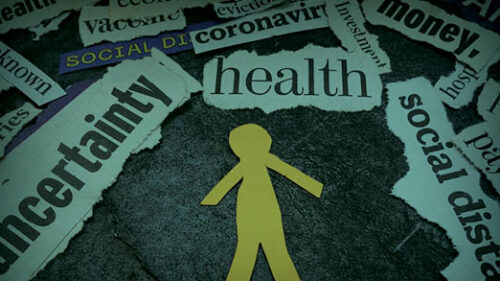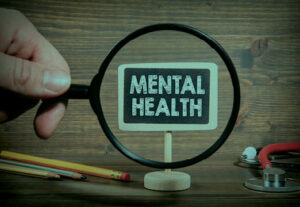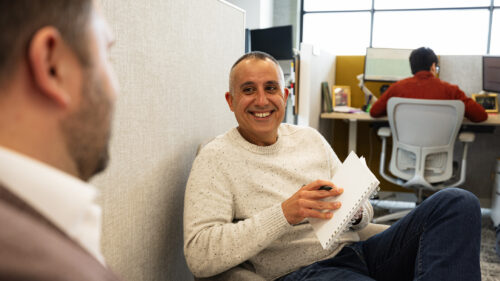As much as many of us want to leave 2020 in the dust and never look back, our Joyages team wanted to take a moment to do some inventory on our mental wellbeing and the impact the last year might’ve had on it. However, instead of the traditional blog format you’re used to seeing here, we wrote this one with a twist!
What have we seen and heard? How are people really doing? To answer these tough questions, our own Joyages Co-founder Brett Newman did a virtual, informal sit-down question/answer with another Joyages Co-founder Claire Burnett. Take a look.
The Impact of Control on Mental Health
Brett Newman: Claire, thanks for taking some time to talk through a very important topic like mental health, during what feels like what was just the most mentally draining year we’ve lived through.
The first thing that comes to my mind during the last year is control. If we’ve learned anything from 2020, it’s that we aren’t as in control of our situation as we thought.
Our health, our economy, our politics, our emotions — all of these things are changing rapidly really without our input. But, what’s interesting is that the opposite of control hasn’t necessarily been chaos, but rather, anxiety…at least that’s been my experience personally. Do you agree? How have you tried to manage that?
Claire Burnett: Anxiety has been a major topic of discussion this year, and rightfully so. We’ve all experienced some form of a loss of control and, furthermore, we’re all dealing with a fear of the unknown. We have no clue when this will end and what our new normal will look like.
But one of my favorite quotes reads: “It’s not the darkness we fear, it’s what the darkness masks.”
For me, personally, the way you get through any sort of darkness is by taking things one step at a time. Your flashlight (brain) may not be able to light up the entire room, but it can light up just enough for you to see the path in front of you.
We have to fight to stay present, living in the truth of today, because that’s all we actually have control over — what we do with right now. And, I think that was one of the most sobering realities we recognized this year.
Neuroplasticity & Adaption
Brett: Something we talk about at Joyages is a scientific term called Neuroplasticity. Since I’m not a scientist, I had to look it up. Really, what it boils down to is that our brains are not fixed, but rather are always changing, adapting, growing, or shrinking.
The best comparison I have is I-35 where we live here in Texas. I guess at some point construction will be completed, but at this point, I’m skeptical. Could you tell us a bit more about this concept of mindset shifting, and how it could help us through some of these unique challenges?
Claire: Yes, I-35 is my least favorite highway where we live…and honestly, some parts of Neuroplasticity are also my least favorite to talk about. But let’s talk about the promising part first.
Our brains are neuroplastic, which means that you can teach an old dog new tricks! But here is the hard (or my least favorite) part — it doesn’t happen overnight (kind of like the construction on that I-35!). We have to form long-lasting habits in order to re-wire those pathways in our brain.
Traumas automatically store themselves in long term memory…which isn’t a bad thing! Our brain is doing its job: remembering the traumatic event so that it can protect us in the future. Re-wiring the pathways in our brain is absolutely possible, and it happens with intentional diligence to build habits that change the stories our brains have saved away. Constantly shifting our perspective helps our brains learn new stories.
Brett: Thanks for explaining that in a simpler way for all of us, Claire! So, maybe that voice in our head isn’t necessarily a bad thing, but rather, it doesn’t see the full picture and is just trying to protect us.
Being Resilient
Brett: I want to get into a couple of practical things all of us can do, right now, to help improve our emotional health. I know in the Joyages app (which you can get via Google Play or the App Store), you teach a course on resilience. Do you have a quick hit or something you could share with us today to at least help us get started?
Claire: We had a discussion recently about how resilience is actually just the discipline to take a lot of tiny steps that add up to big steps. And for me, it really boils down to how we’re talking to ourselves about the situation.
If something bad happens, we usually fall into two types of beliefs or thinking traps: “What next?” and/or “Why?” Most people spend the majority of their time trying to answer the second question: “Why?” How you answer this question helps determine how you react to adversity.
There are 3 common resilience-lowering (AKA unhelpful) thinking traps coined the “Three Ps” by Dr. Martin Seligman:
- Personalization — We think the situation is entirely our fault, and that it is the result of something wrong with us.
- Pervasiveness — We think the situation is simply an example of everything that is wrong in our lives.
- Permanence — We think the bad feelings we feel in the aftermath of a challenging situation are going to last forever.
Similar to my answer in the last question, changing perspective is crucial. We have to retrain our brain to take healthy shortcuts — ones that build our resilience instead of decrease it.
A good exercise is to pay attention to how you talk to yourself, and when you catch yourself saying something unkind to or about yourself, replace it with a positive truth.
Have Humility
Brett: As we wrap up, I wanted to briefly talk about the general topic of civil/social unrest, and the impact that has also had on our emotional health. I know you’ve been thinking a lot on this topic, and I wanted to give you a chance to share maybe one or two things that have been on your mind related to this and how we can move forward together.
Claire: I’ve been in a lot of discussions around this topic, and I think I’ve come to an unwavering understanding around the fact that we must always start with humility.
It takes humility to research and educate yourself on topics you don’t know or that may not personally impact you. It takes humility to not invalidate another’s feelings and opinions simply because we do not agree, understand, or have never experienced said situation. It takes humility to recognize that one person’s feelings are not more important than another. It takes humility to listen and learn…to approach a conversation looking to understand and find common ground rather than win an argument. Humility.
My advice to everyone when it comes to the topics of civil or social unrest is to start with humility. And if you find yourself tired and frustrated, have enough humility to temporarily step away from the conversation until you can do so in a way that is productive.
Brett: Thank you for your honest and accurate words, Claire. I know I can do a better job of listening to understand, instead of to respond.
As we wrap, I want to encourage our readers to do one thing — have hope. So often, it’s not the skills or tools we lack, but rather, the hope and confidence in ourselves and others.
And, remember to reach out for help along the way. We at Joyages are happy to step in and help. We’re just a phone call or email away!








